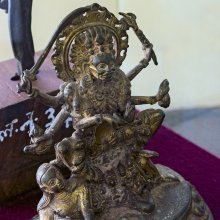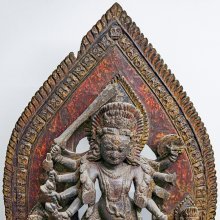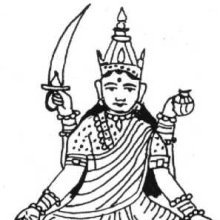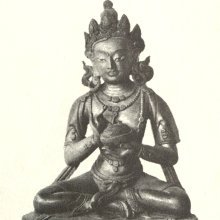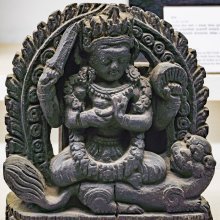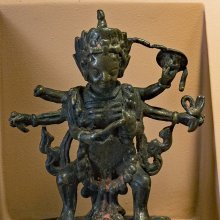Camunda, Cāmuṇḍā: 35 definitions
Introduction:
Camunda means something in Buddhism, Pali, Hinduism, Sanskrit, Jainism, Prakrit, the history of ancient India. If you want to know the exact meaning, history, etymology or English translation of this term then check out the descriptions on this page. Add your comment or reference to a book if you want to contribute to this summary article.
Camunda has 33 English definitions available.
Alternative spellings of this word include Chamunda.
Images (photo gallery)
(+2 more images available)
Languages of India and abroad
Sanskrit dictionary
[Deutsch Wörterbuch]
Source: Cologne Digital Sanskrit Dictionaries: Böhtlingk and Roth Grosses Petersburger WörterbuchCāmuṇḍā (चामुण्डा):—f. eine Form der Durgā [Trikāṇḍaśeṣa 1, 1, 63.] [Hemacandra’s Abhidhānacintāmaṇi 206.] [MĀLATĪM. 81, 6. fgg.] [Rājataraṅgiṇī 3, 46. 7, 1719.] eine der 7 Mātar [Hemacandra’s Abhidhānacintāmaṇi 201,] [Scholiast] [Śabdaratnāvalī im Śabdakalpadruma] [Mitākṣarā 142, 11.] yasmāccaṇḍaṃ ca muṇḍaṃ ca gṛhītvā tvamupāgatā . cāmuṇḍeti tato loke khyātā devi bhaviṣyasi .. [CAṆḌIN im Śabdakalpadruma] — Vgl. carmamuṇḍā .
--- OR ---
Cāmuṇḍa (चामुण्ड):—m. Nomen proprium eines Autors [Oxforder Handschriften 185,b,35.] rāya [WILSON, Sel. Works 1, 332.] rāyapurāṇa [279.]
--- OR ---
Cāmuṇḍā (चामुण्डा):—[MĀLATĪM. 82, 17.] [Kathāsaritsāgara 52, 159. 53, 170.] mantrāḥ [Oxforder Handschriften 94,a,14.] tantra [95,a,30. 108,b,38. 109,a,26.] cāmuṇḍā unter den 8 Nāyikā der Durgā [?25,b, Nalopākhyāna 5. Z. 4 lies CAṆḌĪ (d. i. DEVĪMĀHĀTMYA) Stenzler CAṆḌIN]; die Stelle steht [Mārkāṇḍeyapurāṇa 87, 25.]
Source: Cologne Digital Sanskrit Dictionaries: Sanskrit-Wörterbuch in kürzerer FassungCāmuṇḍa (चामुण्ड):——
1) m. Nomen proprium eines Autors. Auch rāya. rāyapurāṇa n. Titel eines Werkes. —
2) f. ā — a) eine Form der Durgā. — b) Nomen proprium einer Nāyikā der Durgā.
Sanskrit, also spelled संस्कृतम् (saṃskṛtam), is an ancient language of India commonly seen as the grandmother of the Indo-European language family (even English!). Closely allied with Prakrit and Pali, Sanskrit is more exhaustive in both grammar and terms and has the most extensive collection of literature in the world, greatly surpassing its sister-languages Greek and Latin.
See also (Relevant definitions)
Starts with: Camumdaraya, Camundabhairava, Camundakavaca, Camundakhanda, Camundalaghunighantu, Camundamantra, Camundaraja, Camundasahasranaman, Camundatantra, Camundavrata, Camundayantrapujanavidhi.
Ends with: Lucamunda, Pancamunda, Raktacamunda.
Full-text (+87): Camundi, Karnamoti, Candamunda, Camundamantra, Camundaraja, Camundatantra, Carmamunda, Ashtamatrika, Marjarakarnika, Kankeshvari, Rasasamketakalika, Jvaratimirabhaskara, Carcika, Caunda, Pundravardhana, Matri, Mahacanda, Rajamalla, Kali, Irattacamunti.
Relevant text
Search found 27 books and stories containing Camunda, Camumda, Cāṃuṃḍā, Cāmuṃḍā, Cāmuṇḍā, Cāmūṇḍā, Cāmuṇḍa; (plurals include: Camundas, Camumdas, Cāṃuṃḍās, Cāmuṃḍās, Cāmuṇḍās, Cāmūṇḍās, Cāmuṇḍas). You can also click to the full overview containing English textual excerpts. Below are direct links for the most relevant articles:
Sripura (Archaeological Survey) (by Bikash Chandra Pradhan)
Stone Images (5): Sakta Images < [Chapter 3 - Sculptural Programme]
Animal Kingdom (Tiryak) in Epics (by Saranya P.S)
The Skanda Purana (by G. V. Tagare)
Chapter 291 - Greatness of Bhadrakālī < [Section 1 - Prabhāsa-kṣetra-māhātmya]
Chapter 186 - The Greatness of Kanakhaleśvara (kanakhala-īśvara-tīrtha) < [Section 3 - Revā-khaṇḍa]
Chapter 203 - The Greatness of Koṭi Tīrtha < [Section 3 - Revā-khaṇḍa]
The Agni Purana (by N. Gangadharan)
Chapter 146 - Names of different Goddesses
Chapter 135 - Formula for success in Battle (saṅgrāma-vijaya-vidyā)
Chapter 302 - Description of different kinds of potential mantras and herbs
Malatimadhava (study) (by Jintu Moni Dutta)
Part 1.1 - Worship of gods and goddesses < [Chapter 4 - Cultural Aspects of the Mālatīmādhava]
Part 2c - The Plot of the Mālatīmādhava < [Chapter 1 - Introduction]
Part 2g - Act-wise Summary of the Mālatīmādhava < [Chapter 1 - Introduction]
The Devi Bhagavata Purana (by Swami Vijñanananda)
Related products
